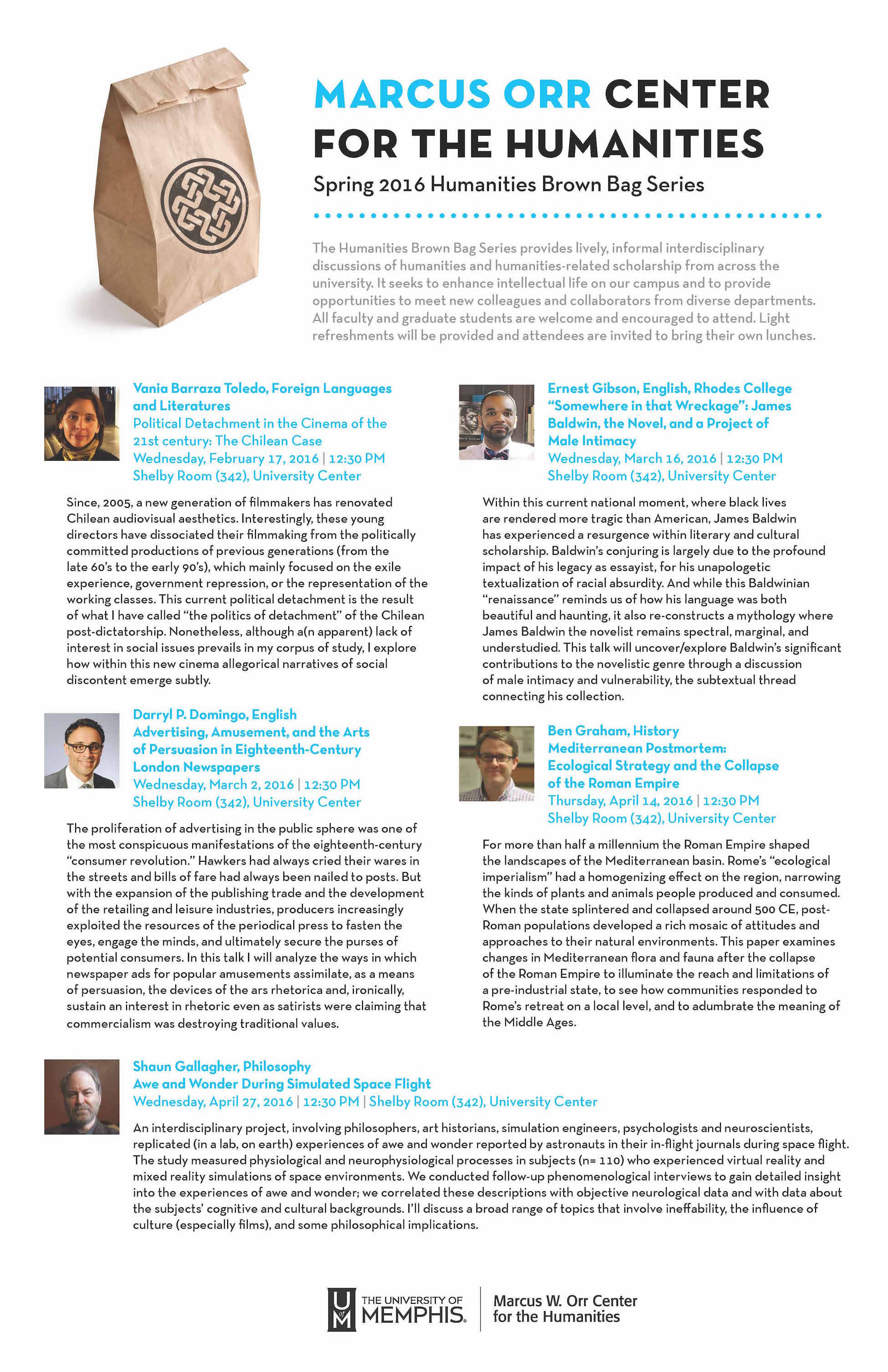Spring 2016 Brown Bag Series
 The Humanities Brown Bag Series provides lively, informal interdisciplinary discussions
of humanities and humanities-related scholarship from across the university. It seeks
to enhance intellectual life on our campus and to provide opportunities to meet new
colleagues and collaborators from diverse departments. All faculty and graduate students
are welcome and encouraged to attend. Light refreshments will be provided and attendees
are invited to bring their own lunches.
The Humanities Brown Bag Series provides lively, informal interdisciplinary discussions
of humanities and humanities-related scholarship from across the university. It seeks
to enhance intellectual life on our campus and to provide opportunities to meet new
colleagues and collaborators from diverse departments. All faculty and graduate students
are welcome and encouraged to attend. Light refreshments will be provided and attendees
are invited to bring their own lunches.
Vania Barraza Toledo, Foreign Languages and Literatures
- Wednesday, February 17, 2016
- 12:30 PM
- Shelby Room (342), University Center
Since, 2005, a new generation of filmmakers has renovated Chilean audiovisual aesthetics.
Interestingly, these young directors have dissociated their filmmaking from the politically
committed productions of previous generations (from the late 60's to the early 90's),
which mainly focused on the exile experience, government repression, or the representation
of the working classes. This current political detachment is the result of what I
have called "the politics of detachment" of the Chilean post-dictatorship. Nonetheless,
although a(n apparent) lack of interest in social issues prevails in my corpus of
study, I explore how within this new cinema allegorical narratives of social discontent
emerge subtly.
Darryl P. Domingo, English
- Wednesday, March 2, 2016
- 12:30 PM
- Shelby Room (342), University Center
The proliferation of advertising in the public sphere was one of the most conspicuous
manifestations of the eighteenth-century "consumer revolution." Hawkers had always
cried their wares in the streets and bills of fare had always been nailed to posts.
But with the expansion of the publishing trade and the development of the retailing
and leisure industries, producers increasingly exploited the resources of the periodical
press to fasten the eyes, engage the minds, and ultimately secure the purses of potential
consumers. In this talk I will analyze the ways in which newspaper ads for popular
amusements assimilate, as a means of persuasion, the devices of the ars rhetorica
and, ironically, sustain an interest in rhetoric even as satirists were claiming that
commercialism was destroying traditional values.
Ernest Gibson, English, Rhodes College
- Wednesday, March 16, 2016
- 12:30 PM
- Senate Chamber (261), University Center
Within this current national moment, where black lives are rendered more tragic than
American, James Baldwin has experienced a resurgence within literary and cultural
scholarship. Baldwin's conjuring is largely due to the profound impact of his legacy
as essayist, for his unapologetic textualization of racial absurdity. And while this
Baldwinian "renaissance" reminds us of how his language was both beautiful and haunting,
it also re-constructs a mythology where James Baldwin the novelist remains spectral,
marginal, and understudied. This talk will uncover/explore Baldwin's significant contributions
to the novelistic genre through a discussion of male intimacy and vulnerability, the
subtextual thread connecting his collection.
- Thursday, April 14, 2016
- 12:30 PM
- Shelby Room (342), University Center
For more than half a millennium the Roman Empire shaped the landscapes of the Mediterranean
basin. Rome's "ecological imperialism" had a homogenizing effect on the region, narrowing
the kinds of plants and animals people produced and consumed. When the state splintered
and collapsed around 500 CE, post-Roman populations developed a rich mosaic of attitudes
and approaches to their natural environments. This paper examines changes in Mediterranean
flora and fauna after the collapse of the Roman Empire to illuminate the reach and
limitations of a pre-industrial state, to see how communities responded to Rome's
retreat on a local level, and to adumbrate the meaning of the Middle Ages.
Shaun Gallagher, Philosophy
- Wednesday, April 27, 2016
- 12:30 PM
- Shelby Room (342), University Center
An interdisciplinary project, involving philosophers, art historians, simulation engineers,
psychologists and neuroscientists, replicated (in a lab, on earth) experiences of
awe and wonder reported by astronauts in their in-flight journals during space flight.
The study measured physiological and neurophysiological processes in subjects (n=
110) who experienced virtual reality and mixed reality simulations of space environments.
We conducted follow-up phenomenological interviews to gain detailed insight into the
experiences of awe and wonder; we correlated these descriptions with objective neurological
data and with data about the subjects' cognitive and cultural backgrounds. I'll discuss
a broad range of topics that involve ineffability, the influence of culture (especially
films), and some philosophical implications.
 The Humanities Brown Bag Series provides lively, informal interdisciplinary discussions
of humanities and humanities-related scholarship from across the university. It seeks
to enhance intellectual life on our campus and to provide opportunities to meet new
colleagues and collaborators from diverse departments. All faculty and graduate students
are welcome and encouraged to attend. Light refreshments will be provided and attendees
are invited to bring their own lunches.
The Humanities Brown Bag Series provides lively, informal interdisciplinary discussions
of humanities and humanities-related scholarship from across the university. It seeks
to enhance intellectual life on our campus and to provide opportunities to meet new
colleagues and collaborators from diverse departments. All faculty and graduate students
are welcome and encouraged to attend. Light refreshments will be provided and attendees
are invited to bring their own lunches.